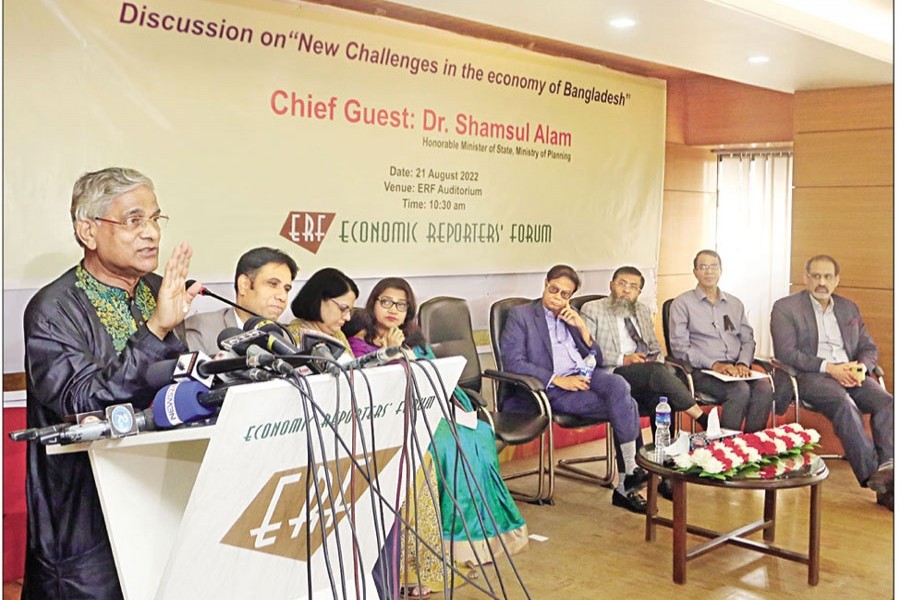Inflationary pressure would continue hurting people in days ahead, too, finance experts say as they see no sign of an immediate respite from spiralling prices.
At a discussion in Dhaka on Sunday they blamed the ongoing Russia-Ukraine war for triggering global energy crisis and global commodity-market volatility, which fuels the flames on overheating price indices.
One way they suggest for the government to come to grips with the galloping prices is further intensify its efforts in bringing stability in US dollar-exchange rates, as pricey greenback escalates import costs of commodities.
To lessen the country's growing dependence on external energy sources, they also suggest the government revisit the energy policy and urgently make energy master plan with serious attention to further intensifying exploration of local energy sources like coal and hydrocarbons.
Government policymakers, economists and business leaders came up with their opinions at a programme titled 'New Challenges in the economy of Bangladesh', organised by the Economic Reporters' Forum (ERF) at its auditorium.
State Minister for Planning Dr Shamsul Alam attended the discussion as the chief guest. ERF President Sharmeen Rinvy chaired the event that was moderated by its general secretary SM Rashidul Islam.
Speaking at the meet, Executive Director of Policy Research Institute (PRI) Dr Ahsan H. Mansur said the monetary policy is not working well to contain the inflationary pressure while bad times are looming large as the general point-to-point inflation may hit 10 per cent in the coming months.

Alleging that the government did nothing to rein in inflation, Dr Mansur noted that the government was trying to face the challenges of inflation through supply-side boost but there was less production of rice while the cultivation of 'Aman' is not giving much hope due to comparatively lower rainfall.
"The price of rice will increase, and it won't work only accusing the market. Although permission was given to import rice, but there was not necessary import of rice. So, the government needs to address inflation as quickly as possible. Otherwise, inflationary pressure would trigger the demand for wage hike in various sectors, not only in tea," he told his audience.
He cautions that the deficit in balance of payments would not go away very soon even though export earnings and inward remittances would increase, imports decline, and there would be a desirable balance in foreign trade.
He was suggesting bringing massive reforms in the revenue system to improve the situation further.
Former President of Dhaka Chamber of Commerce and Industry (DCCI) Abul Kashem Khan said the ongoing war in Europe created a new world order where energy is being used as an weapon.
"We need to focus more on energy security rethinking the existing energy policy. The time has come to make an energy master plan to ensure optimum use of coal and gas in the country so that the country could become self-reliant in energy within the next 10 to 15 years," he says.
Executive President of BKMEA Mohammad Hatem said export orders are failing while the large factories are being compelled to reduce their production.
Under the circumstances, he adds, production cost has increased while the manufacturers are also not getting the adjusted price of additional expenditure from the buyers. On the other hand, the businessmen are feeling pressure since the government has given them less timeframe in repaying loans under the stimulus package.
Alleging that the policy of the NBR is not business-friendly in various sectors, including in bond licensing, HS code, Mr Hatem yet vows that, come what may, the export-earning sectors would continue to maintain their uptrend.
Former President of MCCI Barrister Nihad Kabir said there is sufficient stock of coal in the country and there is a need to ensure maximum utilization of country's own natural resources.
She said the import dependency of the country in energy came to such a pass that the government had to stop power generation in some plants due to the increase in LNG price, putting an impact on growth potential.
Chief Economist of Bangladesh Bank Dr Md. Habibur Rahman told the meet that the inflationary pressure would continue as it has been caused totally from imports.
"Despite this, the central bank has taken various steps to contain inflation bringing stability in the exchange rate, ensuring discipline in the financial sector. For this, efforts are on to control inflation through improving the supply side without raising the interest rate," he says.
Hopefully the exchange rate of the US dollar against Taka would come down soon and there would be improvement in other sectors as well, he adds.
State Minister for Planning Dr Shamsul Alam alleged that the economists of the country mostly tend to express concerns while they could not see the attainments and possibilities of the country.
"But, the foreign research institutions have highlighted the strengths and potential of the economy of Bangladesh," he said.
Citing various apprehensions of doomsayers, he noted that an economist criticised the government for not imposing lockdown and predicted that half a million people would die in the pandemic while many feared that the Padma Bridge project would bring economic disaster.
"But the reality is different. That's why we do not take concerns of economists with importance," he says.
About the issue of inflation, Dr Alam says the price hike of fuel oils has fuelled the inflation while there is no denying the fact that people are now suffering.
"There was no alternative but to raise the fuel-oil price. But, the government has taken various steps and hopefully the inflationary pressure will come down by October," he told the meet.
As there is an apprehension of losing farmland if coal is extracted on a wholesale basis, Dr Alam, an immediate-past member of the Planning Commission, said Bangladesh did not want to take that risk and that is why coal is being imported.


